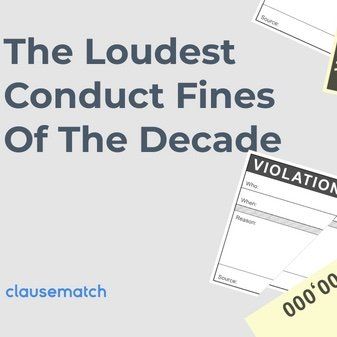This article was provided courtesy of ClauseMatch, a policy management, regulatory change management and compliance platform
With the increase in conduct fines for many high profile companies in the past year, their reputation should be more prominent in the minds of organisations than ever as we enter this new post-COVID world.
The year 2020 was one for the history books. The pandemic put a stop to the global population’s plans, forcing people to work from home and giving them time to focus on their loved ones. The safety of vulnerable people in society became a priority. This, however, did not slow down the efforts of the DOJ and SEC, in their quest to ensure that organizations were abiding to the increasingly pervasive standards for corporate conduct. There was an increase in fines for conduct in financial services all over the globe with the OFAC accessing over $23.5 million in monetary penalties/settlements across 17 public enforcement actions.
While AML/ KYC fines have become increasingly prevalent during the past decade, regulators are now shifting their focus to corporate behaviour, culture, conduct, and any gaps in procedures and controls that fail to uphold ethical standards. The reputational damage that these fines entail can often be far more detrimental than the bottom line hit. The highly publicised 1MDB Goldman Sachs case brought a whole new audience into the world of compliance. After being discovered conspiring to violate the FCPA in connection with a scheme to pay over $1 billion in bribes to Malaysian and Abu Dhabi officials to obtain a profitable amount of business for Goldman, they had to pay over $2.9 billion in conduct fines to the DOJ and the SEC. This case highlighted the importance for investors and parent companies in ensuring that their subsidiaries adhere to global governance benchmarks and applicable compliance standards.
While much economic activity was stymied or suspended as a result of pandemic lockdowns, many businesses thrived in the altered economic landscape. One such beneficiary of the retail recalibration, Amazon, doubled its profits during the year of the pandemic. Despite this boon, the company failed to escape compliance penalties, settling with the OFAC for a sum of $134,523 for allegations that it violated multiple U.S. sanctions programs by selling goods and services to people blacklisted by the U.S. Treasury Department and people in countries or regions that are subject to economic sanctions. In highlighting the compliance failure of high profile players such as Amazon, regulators are sending a message and setting the bar for all organisations to ensure that they are following the regulations. There is a higher standard being established for businesses to strive to when it comes to conduct, a standard that is rising even more in 2021. No one is above the law.
Wells Fargo settled the largest fine for misconduct issued to date in the U.S. in 2020, the bank had to pay out $3 billion for fraudulent account openings and poor treatment of customers. The bank admitted it to the wrongful collection of millions of dollars in fees, the misuse of customer information and taking actions which harmed the credit rating of customers. These wrongdoings resulted in massive reputational damage and loss of trust in the bank and its practices. Wells Fargo has been trying to rebuild its reputation ever since and to their credit, they have been very transparent about this loss of trust with their customers, and they’ve been actively and openly trying to rebuild it.
Michael Volkov, CEO and owner of The Volkov Law Group, LLC, and a top compliance lawyer, has said that escalation in conduct scrutiny from regulators “has been the culmination of a movement of over 20 years. We have seen aggressive enforcement coupled with demands for better compliance programmes and a commitment to ethics. Corporate compliance is going through its biggest revolution. This shift to embedded compliance and a change in culture is happening and will be crucial for financial institutions in the future”.
This aggressive stance is wise as the number of high profile cases the DOJ and SEC have won over the past year has shown that there are a lot of companies not following the regulations and they need to be called out on it.
Evgeny Likhoded, CEO and founder at ClauseMatch, commented: “Last year was like no other. And we see that regulators start paying closer attention to behaviour, ethics, conduct in organisations. That’s why it’s time for the firms to start implementing technology with more cultural emphasis. And there were cases when regulators started applying machine learning to transaction data, they started uncovering fraud before banks. And now regulators want to see banks applying technology in their compliance programs in order to make them work well, managed dynamically in line with regulations and get increased engagement with compliance content from employees.”
In this new age of business, it is not only profits that show the success of a company but their ethics, look at how ESG (Environmental, Social and Governance) has come to the forefront of organisations priorities, they are not just reports on the P&L of a company being done but ESG reports as well. The focus needs to be taken off of money and put onto moral conduct values. As Warren Buffett once said “It takes 20 years to build a reputation and five minutes to ruin it. If you think about that, you’ll do things differently”.
With reputation being more influential than ever and the internet readily offering up information on institutional failures to anyone who looks for it, companies need to ensure all is above board so they keep their reputation intact. By looking at the mistakes made last year by these high profile companies, organizations can ensure that they don’t make the same mistakes in the future.












